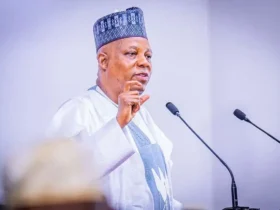Tinubu’s government has requested a fresh $500 million loan from the World Bank to improve dam safety and enhance water resource management across the nation.

Despite the outcry from Nigerians, more debts are being incurred amid the hunger crisis in Nigeria that has led to the #EndBadGovernance protest.
This loan aims to tackle the country’s water security issues and boost agricultural productivity through the Sustainable Power and Irrigation for Nigeria Project (SPIN).
According to a World Bank Project Information Document posted on its website on Monday, the SPIN project focuses on four key areas: institutional strengthening and capacity building, irrigation modernization, improvements in dam operations and safety, and project management.
The proposed approval date for the SPIN project is September 26, 2024.
This initiative will bolster federal and state institutions responsible for water resource management. It includes developing national dam safety guidelines, training for water resources and irrigation management, and creating a comprehensive hydropower master plan.
The document read, “Nigeria faces water security challenges, which impact water availability for drinking water, energy and food production, and are increasingly exacerbated by climate change, putting livelihoods and economic development at risk. Harnessing water storage and dam safety is central to climate change adaptation and mitigation in Nigeria. It is a prerequisite to improving water management for water supply, irrigation, and hydropower generation and offers protection from floods and droughts.
“Nigeria has over 400 dams and an estimated total combined storage of 59 billion cubic meters. 46 per cent of dams are federally owned and are managed by the Federal Ministry of Water Resources and Sanitation, through River Basin Development Authorities. 48 per cent of dams are state-owned and are managed by a state ministry. Many dams are incomplete and more than 50 per cent of the large dams built in the 1970s and 80s require rehabilitation.
“This situation is due in part to institutions responsible for dam management, whether at the federal or state level, having inadequate budget, human resources and capacity to ensure dam management, operation, and maintenance and non-adherence to operational manuals, where they exist.”
READ ALSO: Police Are Corrupt Because Nigerians Are Bribable; They Are Product of Our Society — Force Spokesman
The document highlighted that the country has over 400 dams, many of which urgently require rehabilitation.
The report also mentioned that the devastating floods of 2022, which caused an estimated $6.7 billion in economic damage, highlighted the critical need for improved dam safety and water management.
For the second component of the project, the federal government plans to rehabilitate and modernize 40,000 hectares of irrigated land. This will include establishing and empowering Water User Associations to manage irrigation schemes efficiently.
The third component will focus on rehabilitating and enhancing the safety of priority dams, including conducting risk assessments, preparing emergency action plans, and implementing structural safety improvements.
The final component aims to ensure effective project implementation, monitoring, and evaluation. This will involve establishing a Federal Project Management Unit and Technical Units at both federal and state levels.
Follow Parallel Facts on WhatsApp Channel: https://whatsapp.com/channel/0029VaCQSAoHgZWiDjR3Kn2E









Leave a Reply